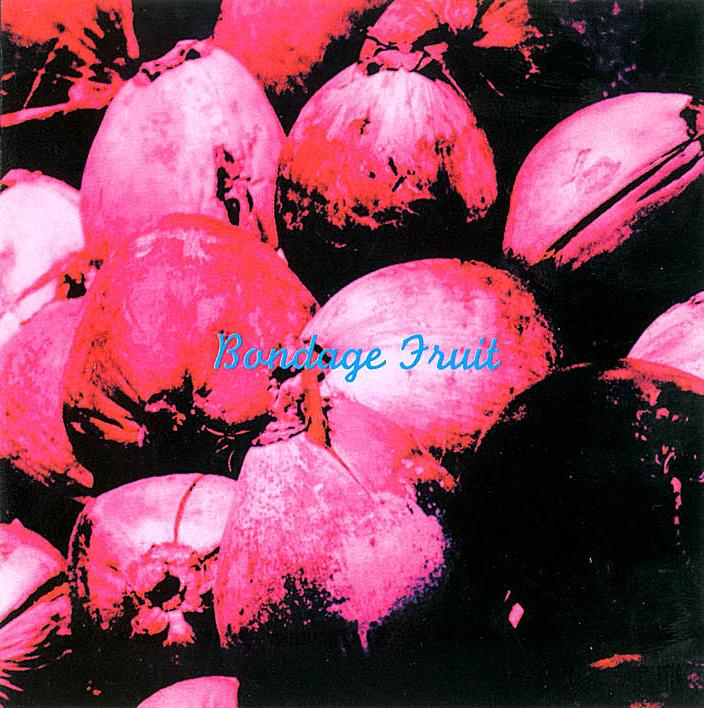
Exposé Online
What's old
Exposé print issues (1993-2011)
- 1 (October 1993)
- 2 (February 1994)
- 3 (May 1994)
- 4 (August 1994)
- 5 (October 1994)
- 6 (March 1995)
- 7 (July 1995)
- 8 (November 1995)
- 9 (March 1996)
- 10 (August 1996)
- 11 (February 1997)
- 12 (May 1997)
- 13 (October 1997)
- 14 (February 1998)
- 15 (July 1998)
- 16 (January 1999)
- 17 (April 1999)
- 18 (November 1999)
- 19 (May 2000)
- 20 (October 2000)
- 21 (March 2001)
- 22 (July 2001)
- 23 (December 2001)
- 24 (April 2002)
- 25 (September 2002)
- 26 (February 2003)
- 27 (August 2003)
- 28 (December 2003)
- 29 (April 2004)
- 30 (September 2004)
- 31 (March 2005)
- 32 (September 2005)
- 33 (May 2006)
- 34 (March 2007)
- 35 (January 2008)
- 36 (October 2008)
- 37 (July 2009)
- 38 (July 2010)
- 39 (Summer 2011)
Reviews
Bondage Fruit — Bondage Fruit
(Maboroshi MABO-014, 1994/2002, CD)

Having first heard about this band in the fading weeks of 1994 via a bootleg tape of one of their live shows, I was, needless to say, duly impressed, and spent most of '95 looking for a copy of this CD, which was released quietly in the early months of last year on a private Japanese label. There must be something in the water in Japan that consistently turns out creative musicians of such high caliber. Bondage Fruit are no exception. A seven-piece of violin, guitar, bass, drums, vibes+marimba+glockenspiel, and two vocalists, their music seems to draw primary influence from the avant, ethnic and zeuhl quarters, yet those influences are well absorbed and the result is something totally original. Their sound is quite aggressive at times, like on the totally over-the-top "Octopus Command," where guitar, violin, vibes, and voices kick off in a frenzied passion — like Eskaton with an attitude — only to give way to a soothing fretless bass solo. The band alternates between these types of hard driving sonic assaults and a more refined middle-eastern ethnic style as evidenced on "Hikou Suru Ko" or "Kodomo No Torokko," which might even recall hints of bands like Aktuala, Popol Vuh, or Embryo, yet Bondage Fruit take it all a couple notches higher on the energy scale. Throughout the album, the vocals are used as instruments rather than a vehicle for lyrics, like other bands might use a wind or horn section. All this over a very powerful and often-complex rhythmic base. Overall, given the high level of originality and musicianship, this is certainly one of the most spirited releases of last year, recommended to all but the least adventurous.
by Peter Thelen, Published 1996-03-01
Bondage Fruit was formed in 1989, and have finally released their first CD. Leader Natsuki Kido is also a member of P.O.N. (and other groups unknown outside Japan). Like other bandleaders he employs studio musicians to realize his elaborate style of music: drums, bass, vibraphone, and female voices (one of which is Aki, from Koenji Hyakkei). No keyboards. The sound has more room to breathe, an airy quality that highlights bass and guitar. I'm sure Kido didn't arrive at this configuration by accident. This CD features nine long pieces, and over their course the style varies quite a bit. Kido favors a sturdy rhythmic backdrop over which he builds expansive melodic patterns, and complex harmonies. In a way similar to the Canterbury ethos, things become looser once the themes have been run through. I also sense a rather heavy tinge of a Magma influence but without their repetition or relentlessness. Elsewhere they lighten the mood with some sensitive violin solos, virtuosic vibe playing, even nice brush work from the drummer to spice it up. The soaring vocal lines over a solid rhythm foundation keep this from ever tipping the scales toward the jazz end. And noisy tendencies are restricted to just one track. One problem encountered by projects like this is a lack of cohesion from one piece to the next. Kido covers a lot of ground here, thus, I hope on his next outing he will hone in on a more consistent approach. All in all this is fine-spirited music, which, shorn of some of its excessive soling, could really appeal to many people looking for something richer than the usual fare.
by Mike Ezzo, Published 1996-03-01
Filed under: Reissues, Issue 9, 2002 releases, 1994 recordings
Related artist(s): Yuji Katsui, Natsuki Kido, Bondage Fruit, Saga Yuki
What's new
These are the most recent changes made to artists, releases, and articles.
- Review: Sterbus - Black and Gold
Published 2026-03-03 - Release: Janel Leppin's Ensemble Volcanic Ash - Pluto in Aquarius
Updated 2026-03-02 15:06:51 - Release: Janel Leppin - Slowly Melting
Updated 2026-03-02 15:05:27 - Release: Alister Spence - Always Ever
Updated 2026-03-02 15:04:11 - Release: Let Spin - I Am Alien
Updated 2026-03-02 15:02:41 - Review: Falter Bramnk - Vinyland Odyssee
Published 2026-03-02 - Review: Exit - Dove Va la Tua Strada?
Published 2026-03-01 - Review: Steve Tibbetts - Close
Published 2026-02-28 - Release: We Stood Like Kings - Pinocchio
Updated 2026-02-27 19:24:02 - Release: Stephen Grew - Pianoply
Updated 2026-02-27 19:20:11 - Release: Thierry Zaboitzeff - Artefacts
Updated 2026-02-27 00:16:46 - Review: Kevin Kastning - Codex I & Codex II
Published 2026-02-27 - Release: Zan Zone - The Rock Is Still Rollin'
Updated 2026-02-26 23:26:09 - Release: The Leemoo Gang - A Family Business
Updated 2026-02-26 23:07:29 - Release: Ciolkowska - Bomba Nastoyashchego
Updated 2026-02-26 13:08:55 - Review: Immensity Crumb - Chamber Music for Sleeping Giants
Published 2026-02-26 - Release: The Gatekeepers - Diary of a Teenage Prophet
Updated 2026-02-25 15:55:58 - Review: Mars Lasar - Grand Canyon
Published 2026-02-25 - Listen and discover: Mordecai Smyth will not break your back
Published 2026-02-25
